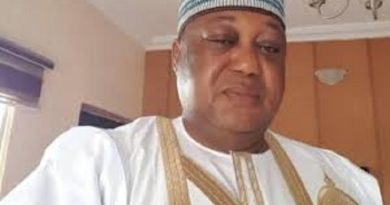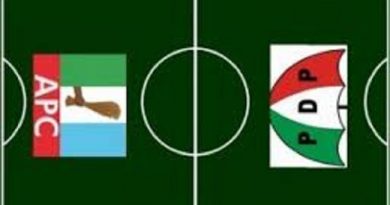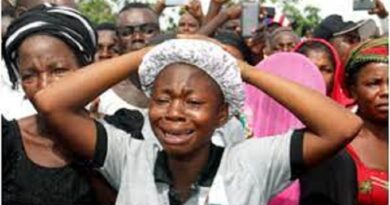‘INEC: We will not compromise the integrity of elections’
‘INEC: We will not compromise the integrity of elections’
Independent National Electoral Commission (INEC) Chairman Prof. Mahmood Yakubu highlights the challenges of conducting credible elections and democratic consolidation at a parley with the media in Lagos.
Nigeria’s size and population make it one of the biggest democracies in the world. It is certainly the second largest presidential democracy after the United States of America. The size of our voter population and elective institutions make elections in Nigeria a huge undertaking. This fact is better appreciated within our regional context. There are 15 countries in West Africa today, including Nigeria. However, with the current voter population of over 84 million, Nigeria has about 11 million more registered voters than the other 14 countries put together which have 73.6 million registered voters. Conducting a general election in Nigeria is like holding election in West Africa and beyond.
Furthermore, the statutory responsibilities of INEC make it both an Election Management Body and Electoral Commission. Section 53 (f) of Part 1 to the Third Schedule the Constitution of the Federal Republic of Nigeria 1999 (as amended) requires the Commission to organize, undertake and supervise all elections to the offices of the President and Vice-president, the Governor and Deputy Governor of a state, and to the membership of the Senate, the House of Representatives and the House of Assembly of each State of the Federation. In order to do so effectively, there are other extensive responsibilities undertaken by the Commission which include:
Nationwide continuous registration of voters and the maintenance of the national register of voters;
Prosecution of electoral offenders; Creation of polling units; Delimitation of electoral constituencies; Voter education and publicity; Management of electoral logistics; Election security in consultation with the security agencies; Strategic engagement with stakeholders;
Formulation of regulations and guidelines for the conduct of elections and electoral activities to give clarity to the provisions of the Constitution and Electoral Act; and maintenance of extensive physical assets (offices, residential accommodation and other facilities) nationwide.
Elections COVID-19 Pandemic:
Voter Access to Polling Units:
For 25 years, between 1996 and 2021, the number of polling units in Nigeria remained the same, despite the progressive increase in the number of the voting population over the years. For instance, in 1999, the number of registered voters was 57,938,945, 60,823,022 in 2003; 61,567,036 in 2007; 67,422,005 in 2015 and 84,004,084 in 2019. Yet, the number of PUs remained the same. While the law gives INEC the power to create new PUs and allocate voters to them, all attempts made by the Commission to do so within the period were met with spurious allegations based on political considerations. Following several unsuccessful attempts to create additional PUs, the Commission established Voting Points and Voting Point Settlements across the States of the Federation and the Federal Capital Territory (FCT).
After wide-ranging consultations with stakeholders and fieldwork by our officials, the 56,872 Voting Points and Voting Point Settlements were converted to full-fledged Polling Units in April 2021 bringing the total number of PUs in Nigeria to 176,846. The Polling Units can be viewed at (https://www.inecnigeria.org/elections/polling-units/).
Election and technology:
Determined to deepen the use of technology and reduce human intervention in the critical stages of the electoral process, the Commission introduced new innovations. A few of them are identified as follows:
The Commission has been discouraging human intervention in the electoral process. Since the 2019 General Election, the following activities are now conducted either partially or entirely online through dedicated portals:
Online Registration:
You will recall that the Commission often undertakes a fresh registration of eligible voters with every general election until 2010 when the first reliable biometric register of voters was compiled. Thereafter, the practice is to undertake intermittent registration of voters on the eve of major elections.
However, in April 2017, this Commission for the first time began the implementation of the registration of voters on a continuous basis as provided in the Electoral Act. By the time the CVR was suspended in August 2018 to prepare for the 2019 General Election, a total of 14,283,734 new voters had been registered and added to the national register of voters, increasing the overall number to 84, 004 084. As of 22nd November 2021, the CVR platform had recorded a total of 4,297,494 fresh registrants while 1,856,771 registrants have validated their application
INEC Voter Enrolment Device (IVED):
In June this year, INEC introduced a special gadget designed in-house by the Commission’s Engineers but fabricated abroad. It performs a variety of functions including physical registration of voters, fingerprint and facial authentication on election day and uploading of the polling unit result sheets to the INEC Result Viewing (IReV) portal. While the device was used as the INEC Voter Enrollment Device (IVED) at the resumption of the Continuous Voter Registration in June this year, it first was deployed for the Bimodal Voter Accreditation System (BVAS) in the Isoko South 1 State Constituency bye-election in Delta State on 11th September 2021 and later for the recently concluded Anambra Governorship election. In both elections, the equipment performed the functions of the Smart Card Readers (SCR) and the Z-Pad.
INEC Result Viewing Portal:
In our effort to engender transparency in the electoral process, the Commission unveiled the INEC Result Viewing (IReV) portal to make available for public view copies of the polling unit election result sheet, known as Form EC8A on Election Day. By Clicking on http://inecelectionresults.com and creating an account and password, any interested Nigerian can have access to the portal and view polling unit results are they are uploaded live. The Nasarawa Central Constituency by election held on 8th August was the first to have its polling units’ results uploaded to the portal, followed by the Edo and Ondo Governorship elections. However, before the introduction of IReV, the Commission had, during the 2017 Anambra State Governorship election, introduced the pasting of Form EC 60E, also known as the “People’s Result Sheet” at Polling Units, where citizens could view the result of each polling unit.
Direct Primaries:
Since it emerged that the Direct Primary clause was included in the Electoral Act amendment Bill, many of you have been asking the Commission for its position. But the issue is not about our position, but the process. In the exercise of its constitutional power, the National Assembly has passed the Bill into law awaiting presidential assent. Once the process is concluded, the Bill becomes law and every person and authority in Nigeria, including the Commission, must obey. The Commission will give expeditious consideration to the law, including the detailed regulations and guidelines for its implementation where necessary.
INEC/media partnership
One major area where we need your help is in containing fake news. The emergence of the Internet brought with it tremendous opportunities for all sectors, including the media and it has broadened the scope of human abilities to share information and knowledge within seconds.
The dynamism of the social media, enabled by the power of the internet, has made it possible for media organisations like yours, to upload narratives which in turn are transmitted to digital platforms such as cell phones, Facebook, Instagram, Twitter and so on, providing an opportunity for millions of people all over the world to watch them within a short time.
Quite often, those who try to undermine the electoral system and their sympathisers take advantage of the free social media space and sometimes even the traditional media to advance their interests and spread falsehood. This can take various forms. They can, for instance, cook up wild allegations against the Commission and/or its officials to frustrate a good policy which they perceive as inimical to their selfish interest. When such allegations get to you, please, thoroughly investigate. Afterall, one of the tenets of your noble profession is “fairness’ and “objectivity.” I implore you to always balance your stories.
Equally importantly, I urge you to understand the Commission’s processes and procedures and the laws governing our activities. The Commission does not believe in censorship. We are also aware that the greatest antidote to fake news is greater transparency and openness. We are committed to that. Let us work together to fight the scourge of fake news.




